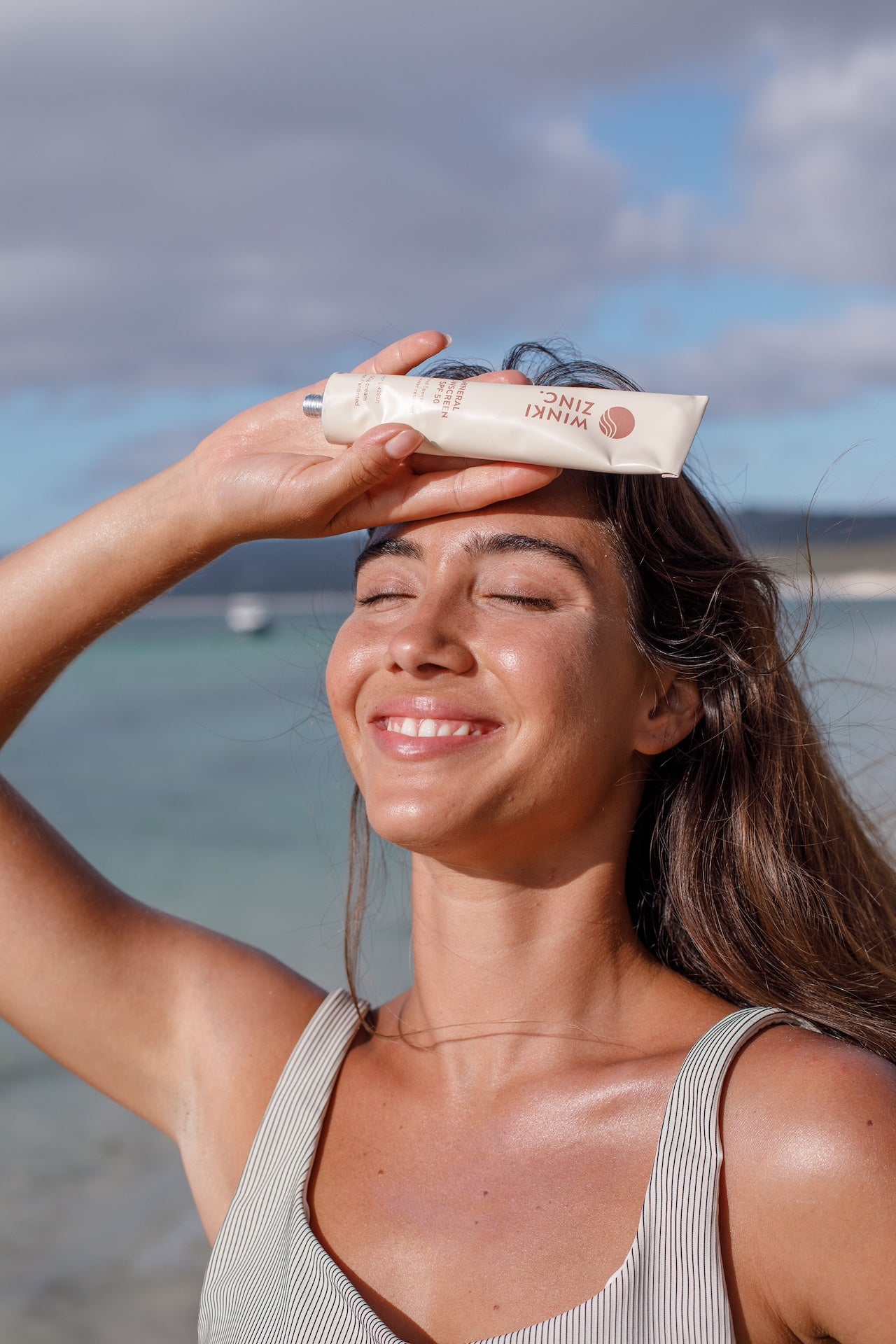In Australia, a staggering 130,000 tonnes of plastic end up in our oceans annually, causing immense harm to marine life.
It's a crisis that demands action, and that action begins with us. This July, join millions worldwide in the Plastic Free July challenge, pledging to reduce single-use plastic for a day, week, or the entire month - you decide. It's a simple step towards a significant change.
But the devastating impact of plastic pollution doesn't stop at our oceans. Emerging research is raising alarming concerns about the potential effects of plastic on human health, particularly for future generations growing up in a world inundated with plastic. At Winki Zinc, we are committed to the well-being of our planet and its people, we feel a deep responsibility to address this issue and protect the health of those who will inherit the Earth.

At Winki Zinc, we've taken a lifelong pledge to create plastic-free sunscreen and zinc. Here's why we think you should embrace plastic-free sun protection too:
The Problem with Plastic Sunscreen Packaging
Sunscreen is crucial for safeguarding our skin from harmful UV rays, but most sunscreens, even claimed “environmentally friendly” ones come in plastic tubes, bottles, or aerosol cans. These pose several issues:
- Difficult to Recycle: Plastic tubes often contain multiple layers of different plastics, making recycling challenging. Most recycling facilities can't separate these layers, leading to landfill waste.
- Safety Concerns: While empty aerosol cans can be recycled, partially full cans pose a risk of explosion or combustion due to pressurization. Additionally, the tiny plastic caps on spray nozzles often escape recycling.
- Low Recycling Rates: Australia's recycling rate for plastic is a mere 10%. This means that approximately 90% of our plastic waste ends up exported, landfilled, or polluting our waterways.
Can sunscreen that comes in plastic packaging really be called Reef Safe?
Given the harmful effects of plastic on our oceans and the alarming rate at which new plastic enters our ecosystems each year, we believe that sunscreen packaged in plastic cannot truly be considered "reef safe."
Recycled Plastic: A False Solution?
Lots of brands promote that they use recycled plastic, but this can actually be worse for the environment… and you. In fact:
- A recent study has found that recycled plastic contains hazardous chemicals, including pesticides and pharmaceuticals, which present risks to recycling workers and consumers, as well as to the environment.
- A new report by Greenpeace USA concludes that recycling actually increases the toxicity of plastics. The report highlights the threat that recycled plastics pose to the health of consumers, frontline communities, and workers in the recycling sector.
These findings suggest that we need to rethink our approach to plastic recycling. We need to find ways to make recycled plastic safer and less toxic. We also need to find ways to reduce our reliance on plastic in the first place.
A note on sugarcane plastics:
- They can be complex to recycle
- They are not biodegradable
- Often companies will claim they use “sugarcane plastic” but the sugarcane content is as little as 20%, while the rest is conventional petroleum based plastic.
Microplastics: A Macro Problem
The plastic pollution problem extends beyond visible waste. Microplastics, tiny plastic particles less than 5 millimetres in diameter, are a growing concern. These particles originate from various sources, including cosmetics, clothing, and industrial waste. They contaminate our oceans, harming marine life through ingestion and the release of harmful chemicals. Disturbingly, microplastics have been found in fish, shellfish, and even humans, raising concerns about potential health risks.

BPA, BPS, and Phenols: Endocrine Disruptors
Another concerning aspect of microplastics is the presence of endocrine-disrupting chemicals (EDCs) like BPA, BPS, and phenols. These chemicals mimic hormones in the body, particularly estrogen, and can interfere with normal hormonal functions. This disruption has been linked to various health issues, including reproductive problems, developmental delays, and an increased risk of certain cancers. The presence of EDCs in microplastics further underscores the need to reduce plastic pollution and its impact on human health.
Non-Greasy, Effective, and Plastic-Free: It's Possible with Winki Zinc
Finding effective sun protection that's also environmentally friendly doesn't have to be a compromise. At Winki Zinc, we offer sustainable SPF 30 Zinc and SPF 50 Mineral Sunscreen solutions. We prioritise natural ingredients that are safe for both your skin and the environment, including our precious oceans. Some of our 100% plastic free packaging features include:
- Compostable & recyclable cardboard eco-sticks (refer to our “unpacking sustainable packaging” article
- Features our new innovative cork gasket found- a sustainable alternative to plastic foam seals (found in most aluminium bottles!)
- Infinitely recyclable aluminium tubes and bottles
- Beyond 'Reef Safe' non-nano mineral zinc oxide
- Palm Oil Free
- Fragrance Free
- Synthetics Free
- Vegan

Join the Plastic-Free Movement
This Plastic Free July, challenge yourself to reduce plastic waste and make the switch to plastic-free sunscreen. Explore our range of natural, effective sunscreens in eco-friendly packaging. Together, we can protect our oceans, our health, and create a brighter future for all.
To get involved, and to find out more about Plastic Free July, visit www.plasticfreejuly.org
Together, we can protect our oceans, marine life, and create a healthier future for all. Join the movement, and let's make a lasting difference.
Resources:
World Wildlife Fund (2023), Plastic in Our Oceans is Killing Marine Mammals, https://wwf.org.au/blogs/plastic-in-our-oceans-is-killing-marine-mammals/
Earth Day, (2023), WHAT YOU NEED TO KNOW ABOUT THE IMPACT OF PLASTICS ON HUMAN HEALTH, https://www.earthday.org/what-you-need-to-know-about-the-impact-of-plastics-on-human-health/
Gbor, Nina (2024), The Australia Institute: The decision to scrap the levy on waste exports means more plastics will end up in landfill, https://australiainstitute.org.au/post/the-decision-to-scrap-the-levy-on-waste-exports-means-more-plastics-will-end-up-in-landfill/
Greenpeace Report (2023). Forever Toxic: The Science of Health Threats from Plastic Recycling https://www.greenpeace.org/usa/reports/forever-toxic/
Nylanden, N. (2023). The Toxic Truth About Plastic Recycling. Sulapac Blog https://www.sulapac.com/blog/truth-about-plastic-recycling/
Greenpeace International. (2023). New Report Calls Out Toxic Hazards of Recycled Plastic. Press Release.https://www.greenpeace.org/aotearoa/press-release/new-report-calls-out-toxic-hazards-of-recycled-plastic-as-global-plastics-treaty-negotiations-resume/
Earth Easy, (2024), Bioplastics: Are They Really Better https://learn.eartheasy.com/guides/bioplastics-are-they-really-better/
Department of Climate Change, Energy, Environment and Water, Australian Government (2021) National Plastics Plan Summary, https://www.dcceew.gov.au/environment/protection/waste/publications/national-plastics-plan-summary
Plastic Free July, Take the Challenge, https://www.plasticfreejuly.org/take-the-challenge/
Consumer reports (2024) What’s the Difference Among Microplastics, Phthalates, BPA, and PFAS? https://www.consumerreports.org/toxic-chemicals-substances/microplastics-phthalates-bpa-pfas-a1059022044/
Ragusa et al, (2020) Plasticenta: First evidence of microplastics in human placenta, https://pubmed.ncbi.nlm.nih.gov/33395930/




